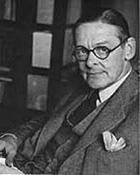The Love Song Of J Alfred Prufrock Poem by Thomas Stearns Eliot
The Love Song Of J Alfred Prufrock
The text of this poem could not be published because of Copyright laws.
Eliot’s reputation as a poet has waxed and waned somewhat over the course of the past century. At the moment it appears to be undergoing a period of rather prolonged waning, along with that of poetry in general. There is much to criticize in Eliot’s writing. It is frequently highbrow and esoteric and staunchly resistant to any form of populism, which he detested. He is for the most part self-absorbed, right-wing, and occasionally anti-Semitic, although he later repudiated this latter aspect of his earlier work. Notwithstanding, however, no other writer in the English language of the past century has addressed with such persistence what may be the central themes of 20th century literature, namely, the failure of western culture, man’s increasing sense of alienation from society and the loss of God. In this early poem Eliot creates a kind of icon of this sense of angst in the figure of the poem’s eponymous hero. Prufrock has come to stand as a sort of emblem of 20th century man, but it is chiefly the negative aspects that Eliot dwells on. He seems to be quite literally ‘the man in the street” that mythical being so beloved of mid-century politicians. Indecisive, purposeless, cowardly and self-serving, overwhelmed by a sense of nameless guilt – original sin, as Eliot himself might have described it later after his conversion - the very name suggests a sort of feminized man, impotent to deal with any of the genuine problems that face him. Smothered by social convention, he occasionally has a crazy vision of some other sort of existence. “I should have bee a pair of ragged claws/ Scuttling across the floor of silent seas”. But the image seems absurd and incapable of significance. The prosody of the poem too is odd, there is a lot of rhyme but it seems broken and dysfunctional; basically it is free verse. What saves this poem and makes it good deal more readable than some of Eliot’s later work, are the thin wisps of humor and self-irony, with which Eliot lightens up his theme. If there is a strong sense in the later writing of taking oneself too seriously, then that is not the case here and there are some delightful bits of self-observation. “I have measured out my life in coffee spoons.” At the time it was written the poem was regarded as extremely modern and makes extensive use of the technique of symbolism, developed by French writers at the turn of the century to imbue relatively commonplace description with a variety of emotional overtones. “The evening is spread out….like a patient etherized upon a table.” How high up my list of the Top 50 do I put Eliot? Well he’s one of the writers I admire, occasionally despise, rather than love, so not at the top, but there’s no doubt that he’s a major writer so in the end about midway I suppose.
there is this rustling in Eliot's poems, the sound of wanting to be unmasked.-rena silverman
I don't know anything about poetry. I write and I read and if I like it then it's good. What I DO know is when I read this to my true love it works beautifully. Job done Ez.
I like TS Eliot; he is an intellectual who distrusts intellectuals, a complex man who dislikes complex people. Who is JA Prufrock? ? ? A man of indecision, a man who has experienced much of Life, but a man who is a passive observer; his love song is frustrating because he is too cautious. He looks forward to Death because it will end his empty love-song.
This poem has not been translated into any other language yet.
I would like to translate this poem
The poem offers a fine example of the use of human psychology. The behaviour of Mr Prufrock shows his mental agony, inferiority complex and suppressed desire. Mr Prufrock has been presented by Eliot as a tragic figure with the classical flaw and timidity. This timidity of his forces him not to take any action. He is intensely self-conscious and always thinks what the lady might say when he would present himself before the lady. He thinks she will comment 'How his hair is growing thin? ' And again 'But how his arms and legs are thin? ' Prufrock is quite aware of his tragic flaw hence to attain required courage and strength he takes shelter of fasting and praying and tries to compare himself to John the Baptist but all ends in smoke as he suffers bitterly from this tragic flaw. I liked the poem for its strong structure and vivid imagery.